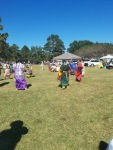Hello – Monday!
We start off Today our Mardi Gras Celebration Party!
What is Mardi Gras ? Lisa definition- well it’s an excuse to have a good time -let loose and celebrate -until the start of Lent. When we are suppose to repent.
Wikipedia -Definition-
Mardi Gras (/ˈmɑːrdiɡrɑː/), also called Shrove Tuesday,[1]or Fat Tuesday,[2][3][4][5] in English, refers to events of the Carnival celebrations, beginning on or after the Christian feasts of the Epiphany (Three Kings Day) and culminating on the day before Ash Wednesday. Mardi Gras is French for “Fat Tuesday”, reflecting the practice of the last night of eating richer, fatty foods before the ritual fasting of the Lenten season.
Related popular practices are associated with Shrovetide celebrations before the fasting and religious obligations associated with the penitential season of Lent. In countries such as England, Mardi Gras is also known as Shrove Tuesday, which is derived from the word shrive, meaning “confess“.[1]
Why Louisiana has Mardi Gras?
The expedition, led by Iberville, entered the mouth of the Mississippi River on the evening of March 2, 1699 (new style), Lundi Gras. They did not yet know it was the river explored and claimed for France by René-Robert Cavelier, Sieur de La Salle in 1683. The party proceeded upstream to a place on the east bank about 60 miles downriver from where New Orleans is today, and made camp. This was on March 3, 1699, Mardi Gras, so in honour of this holiday, Iberville named the spot Point du Mardi Gras (French: “Mardi Gras Point”) and called the nearby tributary Bayou Mardi Gras. Bienville went on to found the settlement of Mobile, Alabama in 1702 as the first capital of French Louisiana.[15] In 1703 French settlers in Mobile established the first organised Mardi Gras celebration tradition in what was to become the United States.[14][16][17][18]The first informal mystic society, or krewe, was formed in Mobile in 1711, the Boeuf Gras Society.[16] By 1720, Biloxi had been made capital of Louisiana. The French Mardi Gras customs had accompanied the colonists who settled there.[14]
Okay -so that’s our history lesson for today -Now party time! Mardi Gras info for more fun facts.
Check back today as I post – crafts, decorations and more ! Lisa
























